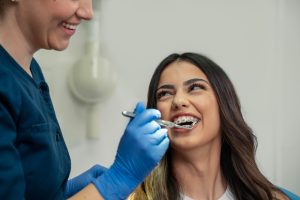TMJ Ankylosis Treatment in Pembroke Pines, Fort Lauderdale, and Aventura, FL
The Dental Care Group: Restore Your Jaw Movement and Quality of Life
Temporomandibular joint (TMJ) ankylosis can severely impact your ability to perform everyday functions like eating, speaking, and even breathing. It is a condition characterized by the fusion or restricted movement of the TMJ, which connects your jawbone to your skull. The Dental Care Group offers advanced diagnostic and treatment options to help you regain jaw mobility and improve your overall well-being.
If you’re experiencing jaw pain, stiffness, or difficulty opening your mouth, early evaluation is key. Contact The Dental Care Group today to schedule a TMJ evaluation. Call our Aventura dental office at 305-935-2797, Pembroke Pines at 954-430-2300, or Fort Lauderdale at 954-963-3706. We are voted Best Dental Office in Miami-Dade for 2024 by the Miami Herald!

The Dental Care Group: What Our Patients Say About Us
At The Dental Care Group, we pride ourselves on delivering exceptional care and life-changing results. The experiences of our patients speak volumes. Whether it’s routine dental cleanings or advanced TMJ treatment, our team is committed to providing compassionate, high-quality dentistry in Aventura, Pembroke Pines, and Fort Lauderdale. Discover what our patients have to say about their journeys toward healthier, more confident smiles!
- “This was my first visit. I was in tremendous pain. Dr. Glicksman staff was kind and helpful, especially to elderly me who couldn’t think straight to deal with the health care apps. Dr. Glicksman asked all the right questions. Explained things well and saw problems other dentists did not see or consider. His office has top of the line diagnostic machines. I look forward to having my multiple teeth problem’s solved on the next visits.” –Lisa Lehman
- “I have had the best experience working with Dr. Rick Mars, Dr. Michael Zinn and Dr. Matthew Fine. From routine cleaning, Invisalign, general dentistry and finally implant surgery the staff at both Fort Lauderdale and Aventura have been courteous, professional and caring every step of the way. I just finished my last phase of the implants with crowns working with Dr. Rick Mars.” –Samuel Turpin
Don’t just take their word for it! Our staff in South Florida is eager to meet you, whether you are seeking regular dental cleanings, TMJ treatment, or more extensive dental restorations. The Dental Care Group is here to support you every step of the way.
TMJ Ankylosis
TMJ ankylosis arises from bony or fibrous adhesion within the joint. This union leads to limited mouth opening, impacting basic functions and potentially hindering mandibular growth, especially in children. Difficulty with chewing, speaking, and maintaining proper oral hygiene are common challenges. It can also affect a person’s appearance.
Types of TMJ Ankylosis
Classifying TMJ ankylosis helps in understanding the nature and severity of the condition. Several classification systems exist, based on location, the tissue involved, and the extent of the fusion. These are some common types:
- True Ankylosis: This affects the joint itself, involving the fusion of the condyle to the glenoid fossa.
- False Ankylosis: This is an extra-articular type, where the issue lies outside the joint.
- Fibrous Ankylosis: This is characterized by the growth of fibrous tissue within the joint.
- Bony Ankylosis: Bony fusion occurs between the mandible and the skull base.
- Mixed Ankylosis: This type involves both fibrous and bony elements.
Causes of TMJ Ankylosis
Several factors can contribute to the development of TMJ ankylosis. Trauma to the jaw is a frequent cause. Infections can also lead to inflammation and subsequent fusion. In some cases, systemic diseases like rheumatoid arthritis play a role. Poor oral hygiene can indirectly contribute to the risk of infections.
Recognizing the Symptoms of TMJ Ankylosis
 Symptoms can vary, but often include:
Symptoms can vary, but often include:
- Pain and discomfort in the jaw joint
- Stiffness and limited jaw movement
- Difficulty opening or closing the mouth
- Clicking or popping sounds in the joint
- Facial swelling
- Headaches and earaches
Who Is at Risk?
While TMJ ankylosis can affect anyone, certain factors increase the likelihood of developing this condition. Individuals with a history of jaw trauma are at higher risk. Those with TMJ infections or systemic inflammatory conditions also face an elevated risk. Younger patients who experience trauma are more prone to developing severe ankylosis.
Treatment Options for Patients Suffering From TMJ Ankylosis
At The Dental Care Group, our priority is to restore your jaw function and alleviate any discomfort you may experience. We provide individualized treatment plans based on a careful evaluation of your specific condition. Our treatment approaches include:
Medication
Medications can manage pain and inflammation associated with TMJ ankylosis. Nonsteroidal anti-inflammatory drugs (NSAIDs) are frequently used to reduce inflammation and relieve pain. Muscle relaxants may also be prescribed to alleviate muscle spasms in the jaw. In some cases, tricyclic antidepressants are utilized for their pain-relieving properties.
Surgical Interventions
Surgery is often necessary to address the underlying cause of TMJ ankylosis and restore jaw movement. Several surgical approaches exist, and the choice depends on the severity and type of ankylosis.
- Arthroplasty: This involves reshaping the joint to improve mobility. Gap arthroplasty creates space between the fused bones. Interpositional arthroplasty involves placing a material between the bones to prevent re-fusion.
- Joint Reconstruction: In severe cases, the joint may need to be reconstructed using autogenous grafts or alloplastic prostheses. Autogenous grafts use bone from another part of your body. Alloplastic prostheses involve synthetic materials to replace the damaged joint.
- Distraction Osteogenesis: This technique gradually separates the fused bones, stimulating new bone growth to lengthen the jaw.
Physical Therapy
Physical therapy is a mandatory part of TMJ ankylosis treatment. These exercises improve range of motion, strengthen jaw muscles, and prevent re-ankylosis. Consistent adherence to a physical therapy plan is key to long-term success.
Orthodontic Treatment
 Orthodontic interventions help stabilize the jaw and maintain proper alignment, especially after surgery. Invisalign, braces, or splints can be used to improve occlusion and support jaw function. Orthodontic care addresses any secondary deformities that may arise from the condition.
Orthodontic interventions help stabilize the jaw and maintain proper alignment, especially after surgery. Invisalign, braces, or splints can be used to improve occlusion and support jaw function. Orthodontic care addresses any secondary deformities that may arise from the condition.
Is temporomandibular joint pain affecting your life? Call our dental office today! To schedule an appointment, please call our Aventura dental office at 305-935-2797, Pembroke Pines at 954-430-2300, or Fort Lauderdale at 954-963-3706.
Frequently Asked Questions
Can TMJ ankylosis resolve without professional intervention?
Unfortunately, TMJ ankylosis is a permanent condition that does not resolve on its own. Fusion or stiffness in the temporomandibular joint necessitates management by skilled professionals. Neglecting treatment can result in a gradual decline in function and the development of other complications.
How is TMJ ankylosis diagnosed?
The diagnostic process starts with a review of your medical history, a discussion of symptoms, and a thorough physical examination. Imaging methods, including X-rays, CT scans, or MRI, may be used to evaluate the extent of the ankylosis and determine the ideal course of action. These methods provide a clear view of the bones and soft tissues surrounding the joint.
Is TMJ ankylosis the same as arthritis?
TMJ ankylosis is not a form of arthritis, although arthritis can be a contributing factor. Ankylosis defines the stiffness or fusion of the joint caused by irregular bone or scar tissue development. On the other hand, arthritis is an inflammatory condition that can lead to the deterioration of joints, possibly resulting in ankylosis over time.
What steps can I take to lower my risk of developing TMJ ankylosis?
While prevention is not always possible, certain measures can lower your risk. Good oral hygiene is fundamental for minimizing the risk of infections that can affect the TMJ. Wearing protective gear during sports or activities with a high risk of facial injury can protect against trauma-related ankylosis. Timely evaluation for any jaw injuries is important for receiving appropriate management and preventing future complications.
What if surgical treatment is needed?
Our goal is to deliver the most effective and least invasive treatments possible. Surgery will only be considered if it provides the best opportunity to restore jaw function and alleviate pain, and improve overall well-being.
After TMJ surgery, our dentists and staff continue to provide outstanding and empathetic follow-up care.
The Dental Care Group: Your Partner in TMJ Ankylosis Treatment
The Dental Care Group’s staff is dedicated to providing comprehensive, personalized care for TMJ ankylosis. Our offices are conveniently located in Aventura, Pembroke Pines, and Hollywood/Fort Lauderdale. We combine state-of-the-art technology with a caring approach to help you get the best possible results. We understand the challenges that temporomandibular joint ankylosis brings, and we are here to support you every step of the way. Let us be your dental team!
Ready to start on your path to better oral health? Call our Aventura dental office today at 305-935-2797, Pembroke Pines at 954-430-2300, or Fort Lauderdale at 954-963-3706.
Locations Performed in
What they say
Yesenia Ruiz
Maria Perez
Lois Cardona
Ellie Moldavsky
Andie Hall
Richard Steward
Richada Wright
Payment Information
CASH

CHECK

CREDIT CARD

Financing

The cost of your treatment will vary depending on your individual needs and treatment plan. We will discuss with you the cost of your treatment and each of your available payment options before you begin, so that you can make the best choice for you.
We offer:
- Easy Payment Options
- Affordable Savings Plans
- Web Specials
- Dental Care Group Discount program



















